


PopEntertainment.com >
Feature Interviews P to T >
Lisa Marie Presley
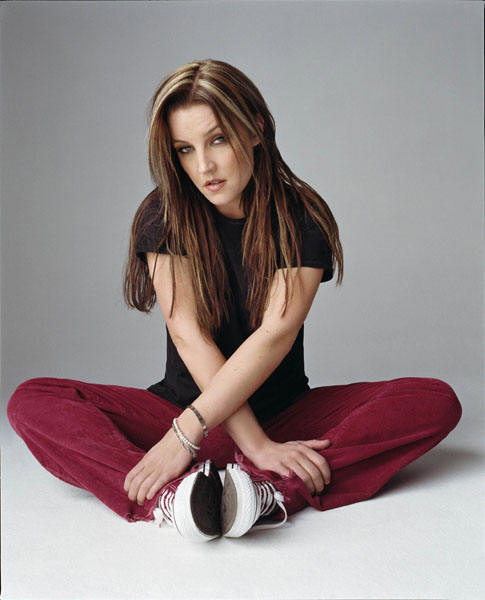 LISA
MARIE PRESLEY
LISA
MARIE PRESLEY
NOW
WHAT...?
By Ken Sharp
Copyright
©2005 PopEntertainment.com. All rights reserved.
Posted:
April 18, 2005.
Throw
out all your pre-conceptions and dispose of the unyielding weight of those
unfair comparisons to her father, Lisa Marie Presley is the real deal. Her
new CD, Now What is a strong collection of immaculately crafted,
emotionally charged songs that showcase Lisa’s distinctive smoky voice and
display her uncompromising artistic vision.
Opening
with the infectious “I’ll Figure It Out,” the album explores a myriad of
naked emotions and intoxicating moods with standouts tracks including her
incendiary cover of Don Henley’s “Dirty Laundry”, the naughty punk rave up,
“Idiot” (featuring Steve Jones of The Sex Pistols on guitar) and the
stunning elegiac ballad, “Now What.”
On her
new album, Lisa Marie Presley is extending a giant middle finger to her
detractors. Make no mistake, she’s doing it her way. Raw and real,
Now What represents an impassioned and confident artist not afraid of
letting you into her own dark world.
What was the first music that affected you on a personal
level?
I grew
up in the Seventies so that music is my favorite. A lot of
singer/songwriters were having success back then and being played on the
radio. That’s the time period of music that really had an influence on me.
The music that had the most profound affect on me was Pink Floyd’s The
Wall. From age thirteen until now, that never dies.
Did the alienation espoused in the
lyrics of that record connect with you as a teen?
Yeah,
completely, I was completely there. That album spoke for me like nothing
else. The whole entirety of it too. I loved it. I loved “Hey You,” “Mother,”
“Comfortably Numb,” all those songs. I loved that. It was recorded back then
but it still stands the test of time. It’s still so powerful. It’s one of
those albums that never dies.
The lyrics on your new album are very strong and expressive.
What lyricists had an impact on you?
I’m a
huge fan of Roger Waters lyric writing. Definitely the lyrics on The
Wall, definitely Dark Side (Of The Moon).
Roger Waters wasn’t afraid to go to a dark place and you’re
not either...
He was
both literal and metaphorical. That was a huge influence on me when I think
about it. Roger Waters’ writing really got to me. “Brain Damage,” all those
kinds of songs. (recites Pink Floyd lyrics) “And if the band you’re
in starts playing different tunes I’ll see you on the dark side of the
moon.” Things like that just got me. That’s the only kind of music that
really affected me, impacted me. I like honest, dark music that‘s saying
something. That’s your job as a writer. Music is some sort of communication.
I think that’s the only kind of music that had a real impact on me. That’s
the music I respond to and that’s the music that I write. The only subject
that I was good at in school was writing. I used to be a serious writer
growing up. I wrote poems, short stories. That’s when I’d be the happiest,
when I could write. That was obvious at a young age.
Do you have to be unhappy to write?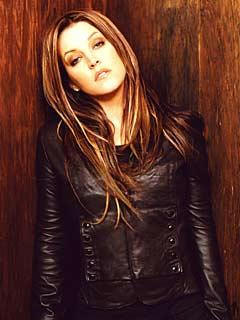
No I
don’t, I think that’s a misconception. I think you can go to the necessary
place to purge something that’s on your mind. I don’t think that an artist
has to live a dark life in order to paint a dark picture, in order to write
a dark song. That’s a misconception that people fall into that you’re angry
or dark or this or that. I say, no, this is what I felt about the subject at
the time. I’m trying to capsulize it and make it universal for other people.
I think people thought I was dark and moody for the first record. The irony
of the whole thing is when I write all of these songs, then I really tackle
it and look at it dead on and put it in a song and give it life in a song it
resolves the whole thing for me. “Shine” from the new album is a really good
example of that. I’m saying a lot without saying a lot. A lot of these songs
on the album are about me tackling of the subject of, I’m kind of an
outsider, and I’m not really part of anything. I’m not part of a clique, I’m
not part of a pop culture. I’m not part of what people thought I should be
before I was born or during or whatever. You name it. I’m not really part of
any of that nor do I wanna be. There’s been times when I’ve been angry at
that or when I’ve tried really hard. “Now What” is a vulnerable take on
having tried and feeling like I failed.
At connecting?
At
being something that I wasn’t or trying to do something that I was told I
should do and it didn’t work out for me.
“Now What” resonates with a skeletal, Pink Floyd feel.
That
song was about me having an anchor in my life and trying to be what everyone
else was being. Then I tried it and I didn’t cut it. I disagreed with it.
Then I felt like the outcast.
People wanting you to conform?
Yeah.
To something, to an idea, to some thing. It’s very general, the subject
matter could apply to anything. But for me personally I’m giving you an
overview about trying to be apart of something that I really thought was the
right thing for me to do and I didn’t do good at it. Maybe I compromised a
little bit and did something under pressure or tried to do something that
everyone was doing and were looked up to doing. But I couldn’t do it. It’s
like, now you were there and now you’re not and what am I gonna do now?
“Shine” is kind of the same thing on that subject but it’s kind of a more
uplifting take on it, like, ‘Look, it’s fine. I’m okay at being what I am.
I’m not beating myself up anymore for not following what everybody is doing
or what I’m supposed to be doing.”
“Turbulence” has very pointed lyrics. Was it cathartic to
write that song?
A lot
of people around me like that song because they know who I wrote it about.
It was one of those songs where I really nailed somebody. I really needed to
get that out of my system. While I was on the road I kept writing lyrics
because there was this particular person who had really raked me over the
coals. I’m pretty good with having a bullshit detector and spotting where
people are coming from. But this one slipped through the cracks a bit. I
needed to get that out (laughs).
I saw one of your performances done to promote your first
record where you were part of the Wango Tango Festival show at the Rose Bowl
in front of over 90,000 people.
It was
terrifying. That’s not my format playing with a lot of pop acts. I came out
there with some really dark songs (laughs) and it wasn’t the deal there. I
shouldn’t have been there.
From
being a very private person to putting yourself in the spotlight in front of
all those people must have been difficult.
I don’t
think I really realized what I was getting into on that front. It was
backwards for me. I had no real experience performing live so I had to find
my way by doing things like that over and over again. It was a bit messy and
thankfully I have different management now and that’s not gonna happen. I
won’t compromise and throw myself into a situation that I can’t handle
anymore. I did take them on because I figured if I have to prove myself I’ve
gotta get used to it. That was kind of my attitude, you’re gonna have to
just do it and deal with it.
That braveness, that strong sense of self, where do you think
that comes from?
I think
that Scientology has a lot to do with that. The fact that it’s a
self-discovery. I’ve been doing it since I was nineteen. I was introduced to
it when I was ten. That’s what I was doing in my twenties, and a lot of my
thirties was making progress there in that religion.
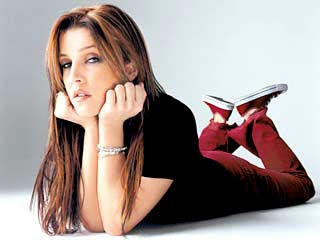 Taking control of your life?
Taking control of your life?
Yeah.
Getting rid of things that aren’t so great and becoming more myself in doing
that.
Knowing
the pressure, unfair comparisons and high expectations that would be placed
on you pursue a musical career, did that make your entry into music a
tougher choice?
I think
I naively went about writing. My main focus was I’m gonna try to break
through this regardless and try to get my own fans and hopefully allow my
music to affect others like it’s done for me in my life. I’ve got a strong
fan base and I’ve gotten really great
responses. I think I was really naďve at the beginning and didn’t know what
mountain I was climbing because it is unfair and people do want to actually
see you fail. And they’re overly critical. This album has been basically
well received but there were a couple of personal shots taken at me by
critics. That’s the thing. It has nothing to do with the music. You can tell
that they have this preconceived idea of me. Even if there’s a compliment
they’d had to make some personal jab. It wasn’t even about the music, it was
about something else they already had in mind about me from my other career
in the tabloids.
How do you get beyond it?
It’s
one of those things where I like to say the term ‘spitting against the tidal
wave’ because that really explains what it feels like. Honestly I think it’s
the fans writing me and the letters that I get and when I meet them. I was
doing an autograph signing in Canada the other day and this girl burst into
tears when she met me and she said, "My father was murdered when your first
record came out and your record got me through it.” And I completely lost
it. I was like, this is why I do music. I think making that kind of
difference with my music on a positive level is my ultimate goal. It scares
me if my records are gonna well. I noticed that some people didn’t like it
when the first record did well and they started coming after me. Campaigns
were out on me later, completely trying to shoot me down because they didn’t
like the fact that the record did good. That side of things is a sort of
nature of the beast. Prior to that I think I dealt with it pretty well. That
wasn’t happening so much. I think when there’s success they start to target
you. (Laughs) I’m almost afraid for this record to do well because now
what’s gonna happen?
What was the first rock show you saw?
Probably Queen. I think I saw them in 1978 or 1979 at The Forum. I remember
bringing Freddie Mercury a scarf of my Dad’s and I gave it to him after the
show. I loved it. I loved the theatrics. I loved Freddie. I thought Queen
were awesome. I’m a big fan of theatrics. Like Marilyn Manson’s live show.
I’ve seen him like eight times now.
How about KISS?
I never
saw them live but I loved them when I was younger. We played on the same
bill (Wango Tango Festival) but I didn’t see them play later. I wanted to
get out of there when I was done. I did what I had to do and I
ran out of there (laughs).
In
the new book, Elvis By the Presleys, you
speak about one of your favorite records growing up being “Sweet
Inspiration” by The Sweet Inspirations, the female singing group that used
to perform with Elvis. What about the Sweet Inspirations music appealed to
you?
I loved
the song “Sweet Inspiration.” They were like The Supremes then but they
weren’t as high profile. I think they were underrated because my father
snagged them at some point. Soulful music always impacted me. Gospel music.
I just loved their voices and I loved that song. I think I had a little 45
and I played that all the time.
Years ago I interviewed David Cassidy and he told me that you visited the
set of The Partridge Family TV show. There’s a story he told me about
how Elvis called the set and spoke to David who hung up on him a few times
because he didn’t believe it was actually him.
I was a
huge fan of The Partridge Family. I was also a huge fan of The
Jeffersons and Good Times, Sanford & Son, all those TV
shows from back then. But I did love The Partridge Family and I did
go to the set. They were in the middle of taping. I was probably three or
four years old. I was told and I kind of have a recollection enough with
this that I was comfortable enough with the show and comfortable enough with
them and felt connected enough with them that I was sitting in my Mom’s lap,
and I got up out of her lap and ran onto the stage while they were taping
and I jumped into Shirley Jones’ lap. They had to stop the taping. I didn’t
think they knew who I was yet. They just knew this little girl had took
running and (laughs) landed in Shirley Jones’ lap. I loved “I Think I Love
You.” In fact this record has got me singing that on “Raven.” The intro on
“Raven,” the three-year old voice is me singing “I Think I Love You.” You
hear my mom saying, “Sing it right” and I just thought that was funny. And
the ‘ba-ba-ba-ba’ in the beginning is the intro for “I Think I Love You.” My
mom would always tape me singing and send it off to my dad when he was on
tour. So she’d have me singing songs into a tape recorder and she had that.
She was getting mad at me and I was sort of pouting and then the song plays.
And at the end she’s telling me to sing a line that I know is wrong so I’m
arguing with her and I keep repeating, “No, it’s not that. It’s ‘I’ve got so
much to think about, I don’t know what I’m up against.” I kept doing that
and then I sing, “I Think I Love You” at the end.
You’ve said, “All true artists are natural rebels.” That
sense of rebellion starts with your
father and works it way through the Rolling Stones to the punk rock scene to
others that would go against the tide. You seem to connect with that rebel
instinct.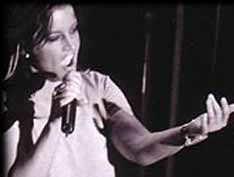
Yeah,
I’m carrying the torch but it’s in my own way. It’s like what I said in my
liner notes to my parents. We’ve all pioneered different roads. He had a huge
road in the 1950’s it was very conservative and he shook everything up.
That was a cross to bear and pissed a lot of people off and made a lot of
people happy all at the same time (laughs). And my mom
(actress Priscilla Presley of Dallas and The
Naked Gun fame) has her own thing
where she was a very young girl and was presented an
opportunity
where I don’t think many women have crossed or walked. And me, I am who I am
and I’m doing my own music in my own
way and developing my own fan base and going against what people probably
think I should do and what I should or shouldn’t be.
You’re taking the road less traveled.
Exactly. So that’s my thing. That’s the sort of burden and cross that I
bear. Then there’s the crucifixion part where ‘you’re not this or you’re not
that’. One of the critics was giving me a compliment but was upset that I
did a Ramones cover on the new album and not an Elvis song. You know what I
mean? You know that going on.
Why did punk rock connect with you so strongly?
The
punk rock groups were the most committed with what they were doing. That was
so attractive to me back then. I liked the Sex Pistols, The Clash. I
actually wasn’t that familiar with The Ramones until I made friends with
Johnny (Ramone), believe it or not. I got a lot of lecturing and he made me
watch Rock And Roll High School and listen to The Ramones
compilation CDs (laughs) after we met. I dug it a lot. It’s a shame. When
the Ramones were out there they didn’t get played, they never got a gold
record. Even when I got on the cover of Rolling Stone, Johnny said,
“You got on the cover of what?” he starts bitching at me,
"Twenty years I
was in the Ramones and we never got on the cover
of Rolling Stone.” That’s the part that I relate to even more now. I
didn’t a record of pop music and I didn’t do a record of Elvis covers and I
didn’t superimpose my voice in with his which is what a lot of people wanted
me to do.
“Here Today, Gone Tomorrow” by the Ramones is a hidden bonus
track on your new CD.
Johnny
picked that song. He told me he wanted me to do that song for the Ramones
covers album. It didn’t work out timing wise, that would have came out
before my first record. All I did last summer was write, do the record and
go the hospital or go to his house. That’s how I spent my time up until the
day he died.
Was Johnny proud of you?
He was
true punk but he was like a father figure to me. He got very paternal with
me. And there were a couple of times like when I was married to Nic (Cage)
that he would say, “You used to be so low profile and I
used to think that
was really cool (laughing, what the fuck are you doing being all over the
place? At all the premieres and you’re getting photographed all the time,
what are you doing? That’s not cool. What you were doing before was cool.” I
was like, I can’t help it that I’m with this person who has to make
appearances and I’m with him. He picked “Here Today, Gone Tomorrow” because
he thought it would be good for my voice. And I thought he was crazy. He
always would scare me by saying “Ramones songs sound easy but they’re not
easy.” He made me freak out. I remember sitting with him in his living room
and I told him that I was gonna do this cover. His eyes lit up and got this
little mischievous twinkle that he was getting quite often towards the end
there, only I brought it out or his wife, which was really funny. He got
that little twinkle turn on and he looked at me and I said, “Okay, I’m gonna
do it. I’m promising you now that it’s gonna go on the record.” Then I
called him and I told him that I really want him to play on it. He said, “I
will if I can sit down.” But the day we did the track was the day he died. I
was supposed to go see him that morning because they were laying down the
track and I had to listen and then I got the call.
So you got Steve Jones of The Sex Pistols to play on it.
Right.
I was petrified to ask him. You want to talk about serious punk musos.
Johnny wasn’t so thrilled about my first record. He liked fifties and
sixties music and that was it and my dad. It was too complicated and there
was too much going on for him. He didn’t like it. I played him “I’ll Figure
It Out” first and he lit up. And he said, “Wow, this a lot better, this is
really good.” It was the first time he gave me a compliment and I was like,
“Wow!" (laughs)
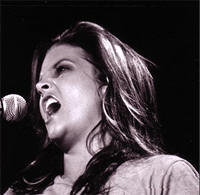 The intro reminds me of The Cure.
The intro reminds me of The Cure.
Yeah,
I’m a big Cure fan too. So then I wanted Steve (Jones) to play on “Idiot.” I
was trying to be all cool and write a song that didn’t have a chorus because
I thought honoring “I Wanna Be The Sedated”, which kind of just starts off
with what is the chorus. I had “Idiot” but it had no chorus. Linda (Perry)
came and write the chords and she left and I wrote the lyrics. I played it
for these two, Johnny and Steve. I told Steve that I
wanted him to play on it. These punk divas are sitting there and they are no
bullshit when it comes to music. Johnny liked it but he looks at me and
goes, “Lisa, you don’t have a chorus. What the fuck are you doing not
writing a chorus?” I’m thinking I’m being all cool and trying to make it all
punk with no chorus. He rips into me and I go (laughs), “Okay,
okay”. And I start laughing. Steve told
me he would take it with him and see if he would come up with some ideas.
The next day I called Linda Perry back and said, “We need to write a
chorus.” So she came and we sat with an acoustic
guitar and she just wrote the chords with me and then left again and then I
wrote the lyrics.
What instruments do you play?
I don’t
play any really. I kind of dabble around. I used to play drums. I can play a
little guitar but I don’t know what I’m doing. I go off of feel, I don’t go
off of actual chords, Anytime anyone tries to teach me I go brain dead. And
I used to play piano so I can dilly-dally around but it’s nothing serious.
Back in 1997, you did a video shown for an Elvis Tribute
concert in Memphis where you’re doing a duet with your father on “Don’t Cry
Daddy.” How did that come about?
I did
that because I was tired of being some figure that just comes out, smiles
and waves and leaves. I was asked to appear at the tribute concert. I said
I’d come. I had this whole vision on this airplane. I think I was flying
from New York to Florida and oddly enough I was in the bathroom (laughs)
and I had this whole vision. I was gonna call David Foster and I knew the
song. I was on the plane and I was thinking about it and I started getting
emotional with of the idea. I definitely had that relationship with my fad
where I felt a lot of pain and I knew that song would be very meaningful. I
loved the song. I called David Foster and told him he needed to produce this
thing for me, that it was only a one-time deal. I’m not selling it, I’m not
selling out but I just wanted to do something for the fans that night that
was something special. David said he’d do it. That was kind of the beginning
of the whole deal. It was only done for the fans for that one night. Believe
me, that could have been packaged and sold. It actually turned out pretty
good I thought.
If I went through your record collection, what would I find?
It’s
always playlists. It‘s everything from the Bee Gees to Marilyn Manson to
Heart to Jim Croce to Gordon Lightfoot to John Denver to Pink Floyd
(laughs) to Aretha Franklin to The O’Jays to Teddy Pendergrass. It’s all
over the place. I always had diverse taste.
Unlike the Seventies music scene, music today is much more
compartmentalized, there’s much less diversity on the airwaves.
It’s
like Stepfordville right now. I think the big revolution is gonna be
satellite because they play no commercials and they’re all over the place
stylistically. That’s what I listen to, I listen to the Seventies station.
It’s funny now ‘cause I was just thinking abut this big market now of people
wearing old concert T-shirts, Cheap Trick, Pink Floyd, this one, that one,
and everyone is sort of missing this time period where it was normal to hear
a variety of music on the radio, this emotional music, this meaningful
music. Music done by singer songwriters getting into the charts. I was
shocked to be honest with you that I even landed in the top ten with my new
CD. I couldn’t believe it. I immediately thought that this is a female rock
record and (laughs) there’s no place for it right now. I really have no
expectations and I was shocked that it landed in there. I was really happy
about it but then I thought I landed at nine and I landed at five with my
first album, and the critics are gonna think, “Oh it didn’t do as well.” But
first of all, the charts and the music sales and all of that is different
now than it was with the first record. And also the first record had a lot
more radio support. We have no radio backup right now. They’re not really
spinning the single. We mostly have done a TV campaign because we knew we
weren’t gonna have radio. Radio is now slowly adding it. There was a lot of
support with “Lights Out”, the first single on the first record but they
kept playing it at pop radio, which is not my venue, which is not my place.
It was shocking to me to make it into the top ten because this is an
uncompromised record. Melissa Etheridge and I were bitching
about it. She interviewed me for Interview m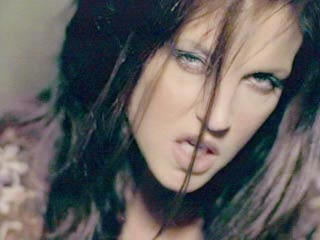 agazine and she was like,
“people keep asking me, when are you gonna put out another record?” because
the last single that anybody played of hers was “Come To My Window.” And
she’s put out five records since then.
There’s
just a lot of craziness going on and I really didn’t think I had a shot. I
had like a couple of melt downs before thinking I was spitting against a
tidal wave. I did know about the pressure of the sophomore jinx and the
curiosity factor and it’s all never wracking. In the end I did hope that the
music would stand out and speak for itself.
agazine and she was like,
“people keep asking me, when are you gonna put out another record?” because
the last single that anybody played of hers was “Come To My Window.” And
she’s put out five records since then.
There’s
just a lot of craziness going on and I really didn’t think I had a shot. I
had like a couple of melt downs before thinking I was spitting against a
tidal wave. I did know about the pressure of the sophomore jinx and the
curiosity factor and it’s all never wracking. In the end I did hope that the
music would stand out and speak for itself.
When did you realize you had a good voice?
I don’t
know that I even have a good voice to be honest with you. What I can do is I
can emote really well. My voice has got its own thing, it’s either gonna hit
you right or it’s not gonna hit you right. I have an ability to emote and
it’s not necessarily technically a good voice. I realized I could do that
and be emotional and use my voice to deliver my emotions in whichever way I
needed to. I probably just realized that when I did a cover of “Baby, I Love
You” by Aretha Franklin when I was twenty-one years old. I was really into
that. I was black on that one. It never came out. I was just seeing if I
could sing. So I went in and covered that one, which is not easy and I
thought, “Okay, some people thought it was black when they heard it ands
that’s a really good sign.”
Were you the kind of person who sang in front of a mirror
growing up?
Always.
I always had a tennis racket, which I used as a guitar and I’d have some
kind of crazy microphone whether it would be a bottle of lotion or whatever
the hell I could grab. I was doing that since I was two or three years old.
But I sort of suppressed my interest in singing. I would sort of dabble and
go take voice lessons and just do scales, which I don’t think did anything
for me. I feel more comfortable singing live now. I’m much better at singing
in public than speaking in public, like at the
Grammys. That flipped me right the fuck out (laughs). I thought why
am I here? I can’t talk at the podium. I find singing more comforting.
Do
you consider Now What a success in the fact that you created a record
of no compromise or do you judge it on commercial terms or how it affects
listeners?
For me,
it’s the letters I got and the response that I got from fans inspired me to
do a second record. I thought if I was affecting these people’s lives then I
would continue, and it’s worth of month of having my ass out in the press
when the record comes out and all the critics. For me to be able to do that
in the end is sort of what I focus on and my other thing was as long as this
record is better and as long as I’m growing I’ll continue do music. A long
time ago when Robert Hilburn was interviewing me I asked him, “Do you think
they’re gonna rip me apart?” He said, “Not long ago people used to have a
career. They out a few records and then one breaks.” You don’t
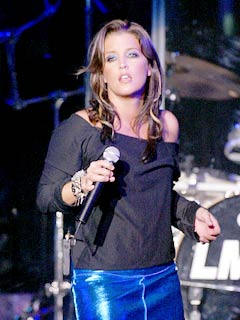 really have
that one now. The attention span of the industry is that of a lizard. It’s
like box office. It depends on how much it makes and then it’s out of
everybody’s mind. It’s like with U2. They had records before they broke
huge. It’s not like that anymore. All I can hope for in the writing and
recording of these records is that I’m building a fan base. Each time I’m
getting better, I’m not getting worse. I want to feel like I’m growing and
getting better all the time. I’d rather have a career like Radiohead. They
have a strong fan base and they occasionally get played on the radio but
mostly they have a lot of fans and they kind of quietly go about their
business and do their thing.
really have
that one now. The attention span of the industry is that of a lizard. It’s
like box office. It depends on how much it makes and then it’s out of
everybody’s mind. It’s like with U2. They had records before they broke
huge. It’s not like that anymore. All I can hope for in the writing and
recording of these records is that I’m building a fan base. Each time I’m
getting better, I’m not getting worse. I want to feel like I’m growing and
getting better all the time. I’d rather have a career like Radiohead. They
have a strong fan base and they occasionally get played on the radio but
mostly they have a lot of fans and they kind of quietly go about their
business and do their thing.
Your first single is a cover of Don Henley’s “Dirty Laundry.”
Do you think the tabloid mentality is worse now than when Henley’s song came
out in the eighties.
Yeah,
It’s a bloodbath now. It’s a fucking bloodbath. It’s so bad like for
instance my record comes out and it lands in the top ten, it’s all good
everything is good. I went to the in-store CD signing for the record and
showed up in a gas station attendant outfit for the signing. All that was
covered by magazines like US Weekly was rip on the fact that I wore a
gas station attendant outfit to this thing. That’s all they paid attention
to. That’s just a stupid minor little example of where we’re at. The record
comes out, it’s a good record, it lands in the top ten. No, none of that.
It’s a good thing that female rock record got into the top ten. Again, none
of that. I chose to record “Dirty Laundry” because that’s the nature of way
things are right now. It’s not just even my own personal life, it’s just
anybody’s and the irony is doing all this press in the U.S. It was really
refreshing to go to Canada because they’re so into the music. They’re not as
sensationalistic and I was shocked. When I was here doing all the interviews
and I was explaining “Dirty Laundry” and they agreed with what I was talking
about. It’s the shows we watch, it’s what we focus on, people being
celebrities for no good reason right now. We’re focusing on these pretty
Barbies and whether they’re fat or thin or tan or who they’re with. It’s
kind of the way things are and then the irony is they use something I said
that’s more on the sensationalistic side and use that as the story.
Choose a few songs you wish you wrote.
I’d say
“Lover You Should Have Come Over” by Jeff Buckley. I’m a huge Buckley fan. I
never saw him live but I saw the DVD. I love that song. Oddly enough,
“Shadowboxer” by Fiona Apple, that’s one I fuckin’ love. The Bee Gees were
amazing, God those boys are talented. Still to this day if anyone breaks out
any of their songs I go crazy. Everyone goes crazy. I also love Gordon
Lightfoot’s “If You Could Read My Mind” or there’s one John Denver song
that just kills me.
Lastly, you and your mom picked the songs that comprise the new Elvis By
the Presleys CD. How about selecting a few
songs by your father that resound strongly on a personal level?
I love
“How Great Thou Art” ‘cause that’s what I was around for. I love the earlier
stuff, too. I was around and watched him record it and went to all the shows
in the seventies. There’s a song called “It’s Over” that killed me. There’s
a song called “Mary In the Morning” that I just love. There’s some obscure
ones that were never singles. “Separate Ways” wasn’t paid nearly enough
attention to as it should have been. It’s really beautiful. I love “Just
Pretend,” that killed me. I also love “You Gave Me A Mountain” too.
Email
us Let us know what you
think.
Features
Return to the features page
